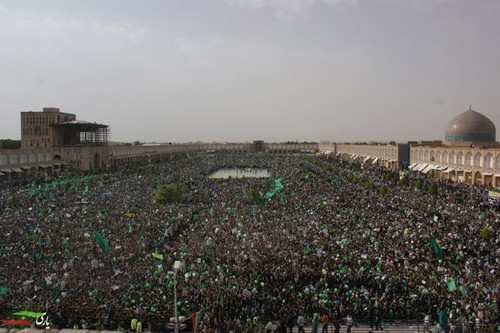I just heard a CNN reporter in Tehran say that Ahmadinejad’s support base was rural.
Is it possible that rural Iran, where less than 35 percent of the country’s population lives, provided Ahmadinejad the 63 percent of the vote he claims to have won? That would contradict my own research in Iran’s villages over the past 30 years, including just recently. I do not carry out research in Iran’s cities, as do foreign reporters who otherwise live in the metropolises of Europe and North America, and so I wonder how they can make such bold assertions about the allegedly extensive rural support for Ahmadinejad.
Take Bagh-e Iman, for example. It is a village of 850 households in the Zagros Mountains near the southwestern Iranian city of Shiraz. According to longtime, close friends who live there, the village is seething with moral outrage because at least two-thirds of all people over 18 years of age believe that the recent presidential election was stolen by President Mahmoud Ahmadinejad.
...
The president was very unpopular in Bagh-e Iman and in most of the other villages around Shiraz, primarily because of his failure to deliver on the reforms he promised in his successful 2005 presidential campaign. He did have some supporters. Village elders confided, “10 to 15 percent of village men, mostly [those who were] Basijis [militia members] and those who worked for government organizations, along with their families.”
...
By Saturday evening, the shock and disbelief had given way to anger that slowly turned into palpable moral outrage over what came to be believed as the theft of their election. The proof was right in the village: “Interior Ministry officials came from Shiraz, sealed the ballot boxes, and took then away even before the end of voting at 9 pm,” said Jalal. In all previous elections, a committee comprised of representative from each political faction had counted and certified the results right in the village. The unexpected change in procedures caught village monitors off guard, as it did everywhere else in the country.
By Saturday evening, small groups of demonstrators were roaming the main commercial streets of Shiraz, a city of 1.5 million residents, and protesting the announced results as a fraud. People refused to believe that Ahmadinejad could have been re-elected. Larger demonstrations took place on Sunday, Monday and Tuesday, beginning in the late afternoon and continuing long after the sun had set. These attracted carloads of supporters from Bagh-e Iman and other villages, including several that were 60 kilometers from Shiraz.
Although the crowds shouted slogans such as “Death to Dictatorship,” most protestors shouted “Allah-o-akbar,” the popular chant of the 1978-79 Revolution. Indeed, in Shiraz, thousands climbed unto the roofs of their homes Sunday to shout ‘Allah-o-akbar’ for several hours.
Most villagers are supporters of the Islamic Republic, but they are ready for the reforms that they say are essential so that their children will have a secure economic future. They saw hope in Mousavi’s promise to implement reforms, even though he is a part of the governing elite.

















Bookmarks